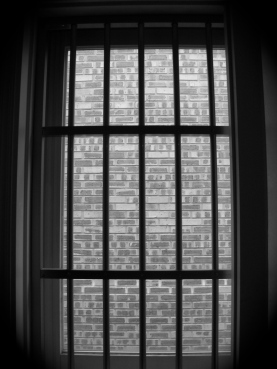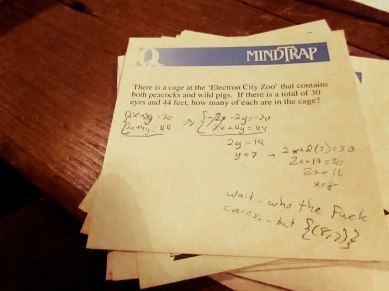As anyone who’s managed it can attest, the process of disentangling oneself from a full-time job is beset with practical and philosophical questions. Going freelance requires a raft of methodical preparation, the cultivation of a decision tree or two, an exit strategy, and, eventually, a bold leap into the unknown.
It’s a life transition also liable to stir up crises of emotion in your closest personal relationships: what if you get a slow start and you and your partner are forced to rely, temporarily, on a single income? What if you’ve misjudged the market and you never quite find your financial feet? What if you’re taking a major pay cut? What if you become depressed, or distracted, or riddled with doubt? If kids are in the mix, what kind of stability are they owed? Who has the health insurance?
These are big questions—big enough to rend an already-shaky union clean in two. I have this on personal authority.
My soon-to-be-ex-live-in-boyfriend turned into a total weirdo when I first caught the freelance bug seven years ago.
He himself had jumped ship from a cushy design job in the city several years prior to move to the Oregon coast and become a surfer/barista/freelance designer, so who better to goad me along as I pondered my own departure from traditional employment, right?
Except it didn’t work that way; it worked in the opposite way. As my plan to quit my stifling, low-rent editor gig materialized and gained traction, I’d often come to him for advice, hoping to mull over the logistics of a boss-free future. And, inevitably, no matter the particulars of the conversation, he’d chirp, “As long as you can support yourself!”
Then, he’d smile tightly before standing up and leaving whatever room we happened to be in.
Aside from making him sounded like a damned parrot, his refrain implied a dismaying subtext: somewhere deep down, it seemed, he feared I was poised to become a financial leach. (This despite the fact that I’d worked 50-60-hour weeks at my newspaper job for the duration of our relationship, was frugal-to-the-point-of-embarrassing, and already had a modest stable of freelance clients lined up.)
“If I don’t make enough money, I’ll work in a boutique!” I promised him. “I’ll nanny! I’ll sell all my books!”
Nothing I could offer assuaged his doubt. That hurt. And ultimately, it became the fatal stab in series of ever-sharpening indicators that he didn’t respect (or even like) me all that much.

Oh, I’d tried to impress him with my creative talents: over and over during our two years together, I’d brought work to him, seeking feedback: a freshly pressed edition of the little community newspaper I produced, a hare-brained plan to pitch a story about DeLoreans to This American Life, a lyrical profile written up about a local musician we both enjoyed, a super-personal blog entry about a trip we took to Mexico.
I’m not sure what I wanted; a little praise and encouragement, maybe? Constructive suggestions? Just to be seen?
Instead, my bids were usually met with a blank-stare-and-shrug-combo, or, if he was busy waxing his surfboard, a flat, “I dunno. I’m not the right person to ask about that.”
And then came this, my craziest creative notion yet: freelancing, full-time. No net to catch me if I tumbled. After landing a steady 20-hour-a-week contract gig to get me started, I quit that newspaper job. And I quickly discovered that being a work-from-home free agent meant spending a lot of time with my own thoughts. As I worked through my first few projects, that time to think brought our dysfunctional dynamic to its pointy head: we weren’t connecting; perhaps we’d never quite connected, and now that failure had become infused with a deeper and more tragic meaning. I mulled and mulled, finally admitting to myself that I was happier alone in my office, shut away from him. I spent more and more evenings in there, hiding out among my stacks of dusty novels, pounding out projects and fabricating excuses to avoid his company.
It took a few more months (and one ill-fated Central American vacation), but eventually, I was able to cop to the truth: My foray into freelancing wasn’t the problem; my choice of life partner was.
So I sat him down on his old plaid couch in our shared living room, right beneath a painting of a boy and his dog frolicking on the banks of a lonely creek that I’d inherited from my grandparents, and I broke up with him.
He was completely shocked. Which, of course, made me feel like a total asshole … and also sort of pissed off.
I tried to reason with him: “You can’t honestly say you’re happy in this relationship! There’s a big old hole right in the middle of it!”
“I’m very happy,” he insisted, in that same, flat tone. But he didn’t look happy. He looked, as he often looked, like he’d have been far happier a million miles away and perhaps already was.
I prodded him: “Are you even in love with me?”
He paused for what felt like ten-thousand eternities before answering: “I think so.”
“Then why don’t you ever read my blog?” I demanded.
I knew how I sounded: whiny and overbearing. Childlike. The petulant artiste, begging to hear, once more, how good I truly was. What did a goddamned blog have to do with anything?

But somehow, over the course of our relationship, shot through as it was with big silences, little slights, and a growing stable of outsize resentments, this question had come to matter desperately.
He had no answer. He didn’t read my blog because … well … he just didn’t read it.
My question and his non-answer to it revealed a fundamental truth that I think holds for many creative types: we need our partners to engage with and actively encourage our creative endeavors. We need them to care about the art we make. Even if that’s a tall, preening order amidst the busyness of building a life together.
My partner, despite his own enormous creative talents, couldn’t meet that need.
I could craft a million explanations as to why: he didn’t think my writing was really any good. Effusive encouragement just wasn’t his style. He simply didn’t love or respect me enough. He was self-absorbed. He was negging me. He was mean.
In the end, for whatever reason why, it was over.
I left him and that little coastal town to decamp for my home city. There, my freelance career flourished, and I took the truth he taught me to heart: I could not and would not spend my life with someone incapable of acknowledging (and occasionally applauding) the fact that I made stuff, that making stuff was central to my identity. In fact, a demonstrated inability to do so was a decisive deal-breaker.
This was years ago by now, and I’ve since married someone else. My life partner is not a painter or a graphic designer or a fellow writer; he’s a math teacher, although he has a knack for foreign languages, sometimes draws, and writes me beautiful cards and poems on holidays and birthdays. He’s optimistic and analytical and great with spreadsheets: in short—he’s everything I’m not, and I’m everything he’s not. And you know what? It works just great. Because we make an active effort to delight in our differences.
I bring him my finished and unfinished work for feedback, my concerns, my bookkeeping SNAFUs, my existential dilemmas, and he listens and considers. He supported me through years of full-time freelancing, and he talked me through the logistics when I decided to cut back to half-time freelancing two years back.
Yes, I sometimes have to prompt him to read my blogs; yes, I sometimes I have to actively solicit feedback, and by “actively,” I mean literally handing him a finished piece and saying, “Read this, please, and tell me what you think?”
 Always, he acquiesces. Always, he finds the time and the interest. Always, he offers the kind of thoughtful feedback that makes me feel seen and appreciated. Even if the writing I bring him is sometimes middling or overlong or not related to anything he cares particularly about.
Always, he acquiesces. Always, he finds the time and the interest. Always, he offers the kind of thoughtful feedback that makes me feel seen and appreciated. Even if the writing I bring him is sometimes middling or overlong or not related to anything he cares particularly about.
Because when you’re in love with a creative person—like, you really, really love them instead of just thinking that, yeah, you maybe kinda might—that’s what you must do.

